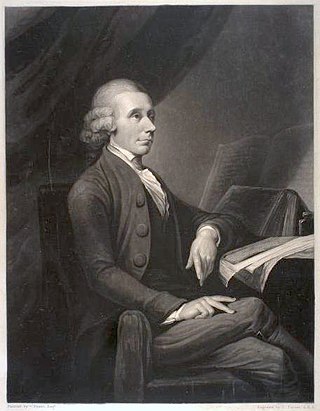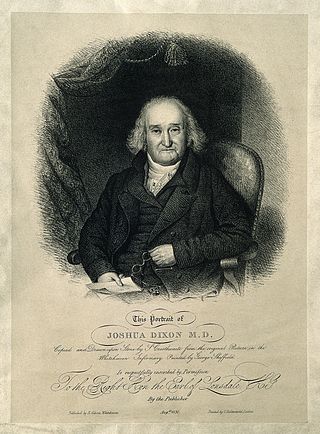Junius was the pseudonym of a writer who contributed a series of political letters critical of the government of King George III to the Public Advertiser, from 21 January 1769 to 21 January 1772 as well as several other London newspapers such as the London Evening Post.

The Theological Repository was a periodical founded and edited from 1769 to 1771 by the eighteenth-century British polymath Joseph Priestley. Although ostensibly committed to the open and rational inquiry of theological questions, the journal became a mouthpiece for Dissenting, particularly Unitarian and Arian, doctrines.
The Lady Margaret Professorship of Divinity is a senior professorship in Christ Church of the University of Oxford. The professorship was founded from the benefaction of Lady Margaret Beaufort (1443–1509), mother of Henry VII. Its holders were all priests until 2015, when Carol Harrison, a lay theologian, was appointed to the chair.
The post of Lord President of Munster was the most important office in the English government of the Irish province of Munster from its introduction in the Elizabethan era for a century, to 1672, a period including the Desmond Rebellions in Munster, the Nine Years' War, and the Irish Rebellion of 1641. The Lord President was subject to the Lord Deputy of Ireland, but had full authority within the province, extending to civil, criminal, and church legal matters, the imposition of martial law, official appointments, and command of military forces. Some appointments to military governor of Munster were not accompanied by the status of President. The width of his powers led to frequent clashes with the longer established courts, and in 1622 the President, Donogh O'Brien, 4th Earl of Thomond, was warned sharply not to "intermeddle" with cases which were properly the business of those courts. He was assisted by a Council whose members included the Chief Justice of Munster, another justice and the Attorney General for the Province. By 1620 his council was permanently based in Limerick.

New College, Durham, or Durham College, was a university institution set up by Oliver Cromwell, to provide an alternative to the older University of Oxford and University of Cambridge. It also had the aim of bringing university education to Northern England.
William Day (c.1605–1684) was an English cleric and biblical commentator.
Annals of Philosophy; or, Magazine of Chemistry, Mineralology, Mechanics, Natural History, Agriculture and the Arts was a learned journal founded in 1813 by the Scottish chemist Thomas Thomson. It shortly became a leader in its field of commercial scientific periodicals. Contributors included John George Children, Edward Daniel Clarke, Philip Crampton, Alexander Crichton, James Cumming, John Herapath, William George Horner, Thomas Dick Lauder, John Miers, Matthew Paul Moyle, Robert Porrett, James Thomson, and Charles Wheatstone.

The Regius Professorship of Hebrew in the University of Oxford is a professorship at the University of Oxford, founded by Henry VIII in 1546.

Louisa, Countess of Craven, originally Louisa Brunton (1782–1860) was an English actress.
Ambrose Dawson (1707–1794) was an English physician.

The terræ filius was a satirical orator who spoke at public ceremonies of the University of Oxford, for over a century. There was official sanction for personal attacks, but some of the speakers overstepped the line and fell into serious trouble. The custom was terminated during the 18th century. The comparable speaker at the University of Cambridge was called "prevaricator".
Alexander Cunningham (1655–1737) was a Scottish diplomat and historian.
Vincent George Dowling (1785–1852) was an English journalist. He was an influential figure in the development of sports journalism, who also worked covertly as a government informer.
Charles Dilly (1739–1807) was an English publisher and bookseller.
The Retrospective Review was an English periodical published from 1820 to 1828. It was founded by Henry Southern, who edited it to 1826, as well as contributing. From 1827 to 1828 Nicholas Harris Nicolas was co-editor with Southern.

Joshua Dixon was an English physician and biographer.
Thomas Doyle D.D. (1793–1879) was an English Roman Catholic priest, associated with the construction of St George's Cathedral, Southwark.
Daniel Dodd was an English painter and engraver.
George Culley was an English agriculturist.
![]() This article incorporates text from a publication now in the public domain : Stephen, Leslie, ed. (1888). "D'Ouvilly, George Gerbier". Dictionary of National Biography . Vol. 15. London: Smith, Elder & Co.
This article incorporates text from a publication now in the public domain : Stephen, Leslie, ed. (1888). "D'Ouvilly, George Gerbier". Dictionary of National Biography . Vol. 15. London: Smith, Elder & Co.




